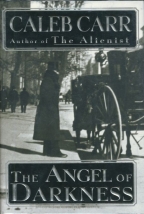The Angel of Darkness
Caleb Carr
Random House
US Hardcover
ISBN 0-679-43532-8
Publication Date: 09-1997
650 Pages; $25.95
Date Reviewed: 08-28-02
Reviewed by Rick Kleffel © 2002

REFERENCES
COLUMNS
|
|
|
The Angel of DarknessCaleb CarrRandom HouseUS HardcoverISBN 0-679-43532-8Publication Date: 09-1997650 Pages; $25.95Date Reviewed: 08-28-02Reviewed by Rick Kleffel © 2002 |
|
|
REFERENCES |
COLUMNS |
Caleb Carr's follow-up to 'The Alienist' was a proposition fraught with danger for the writer. After all, 'The Alienist' was a hugely popular novel that brought a moribund sub-genre to vivid life. It had a huge appeal, had been optioned for nearly a million bucks and was being adapted by a prestige director. The sequel to this novel had a huge built-in audience, and Random House showed a lot of courage to publish this huge book. While Carr didn't manage to avoid every pitfall awaiting him in the deadly Land of Sequels, he did well enough to please just about everyone who enjoyed his first novel in this setting. If you haven't read 'The Alienist', don't read this novel until you do. If you have, but some naysaying when it came out scared you off, maybe it's time to give it a shot.
Carr provides an excellent twist in 'The Angel of Darkness', one that suggests a map that could lead to a series of novels with these characters, but provide a variety that is often lacking in serial fiction. This novel is told by former street urchin Stevie Taggert, not by Charles Schuyler Moore, as was 'The Alienist'. Stevie's narration offers a different prose style, a different focus and a slightly lighter touch than Moore. That lighter touch is certainly necessary, as Kreitzler's and Stevie's nemesis is actually as dark as that of the first novel. What at first appears to be a kidnapping quickly leads to a nurse who might be a killer of children.
Some readers may have a problem with the tension in this novel, which shifts from a find-the-criminal mode to a convict-the-criminal mode. In this realm, Carr is able to bring in Clarence Darrow to liven up the courtroom scenes. Readers familiar with Darrow through J. Anthony Lukas' non-fiction work, 'Big Trouble' will find that Carr does not overheat the already voluble character of Darrow. It's a nicely done performance, not a walk-on, and not a histrionic bit of overkill.
Carr also spends more than a little time analyzing not just situations but point of view that will be foreign to modern readers. In doing so, he's able to delve into subjects with a fresh vigor. In this case, he addresses the rights and more importantly the prevailing perceptions of women. What we take for granted, both good and bad, was not always the case. Carr's ability to provoke thought while evoking a different time and place is one of the primary pleasures of this novel.
Of course, as with 'The Alienist', there's a lot of detailed distressing material. More than that novel, this book is not suggested for the softhearted. The thrill of discovery may be gone, but Carr shows that he has more than just a new take on an old genre to please the reader. There are a number of other characters in Kreitzler's group of crime-fighters who we can only hope are jostling to be noticed, waiting to be heard. When Carr returns to this world, his readers will be waiting.